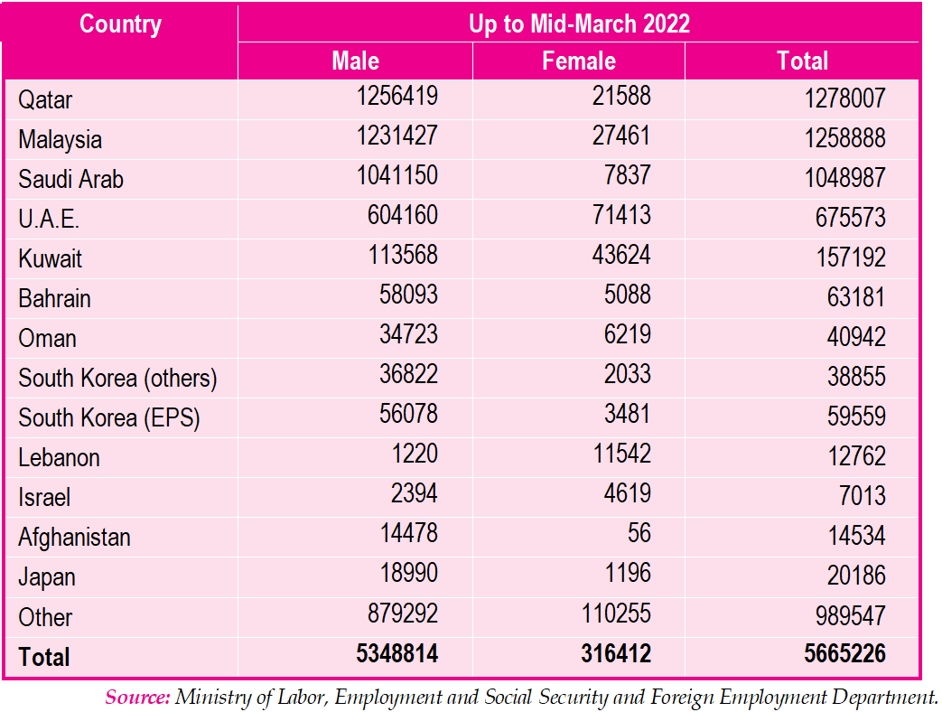Foreign Employment Situation in Nepal
Foreign employment in Nepal refers to the migration of Nepalese workers to other countries for employment purposes. It has become a significant source of income and livelihood for many Nepalese households. The majority of Nepalese migrant workers are employed in countries in the Middle East, such as Qatar, United Arab Emirates, and Saudi Arabia, as well as in Malaysia and South Korea. This helps them make money and support their families. The government of Nepal has made rules to make sure they are safe while working in other countries. But, sometimes they still face problems. People from Nepal have been going to other countries for work for over 300 years, but it has become more common in recent times due to globalization.
Current Foreign Employment Situation in Nepal
In Nepal, around 500,000 individuals join the labor force annually. However, due to limited job opportunities in the country, there is a high demand for foreign employment. As a result, 5.66 million young people have gone abroad for employment, either through formal or informal channels. Out of this number, 1.5% are skilled workers, 24% are semi-skilled workers, and 74.5% are unskilled workers. Institutionally, 110 countries have been opened for foreign employment.

As of Mid-March 2022, 56,65,226 individuals have received approval for foreign employment. Out of these, 53,48,814 are male and 3,16,412 are female. At the end of the fiscal year 2020/21, the total number of individuals who received approval for foreign employment was 44,66,973, consisting of 42,48,547 males and 2,18,426 females.
Advantages of Foreign Employment for the Nepalese Economy
Foreign employment can have several advantages for the Nepalese economy. Some of the significant benefits are as follows:
1. Remittances: One of the most significant advantages of foreign employment is the remittances that foreign workers send back to Nepal. This provides a significant source of income for Nepalese families and communities, which can help to reduce poverty and improve living standards.
2. Reduced Unemployment: With limited job opportunities within Nepal, foreign employment provides a way for Nepalese workers to find employment and earn a living wage. This can help to reduce unemployment in the country.
3. Skill Development: Working in a foreign country provides Nepalese workers with the opportunity to learn new skills and gain valuable experience. This can increase their chances of career advancement in the future and contribute to the development of the country’s workforce.
4. Increased Investment: With more money coming into the country through remittances, there is an opportunity for increased investment in businesses and infrastructure. This can contribute to economic growth and development.
5. Improved Standard of Living: The income from foreign employment can lead to an improved standard of living for Nepalese workers and their families. This can result in better healthcare, education, and living conditions.
6. Technology Transfer: Nepalese workers who work abroad can bring back new technologies and ideas that can contribute to the development of the country’s economy.
7. Job Creation: The growth of foreign employment can lead to the creation of new job opportunities in industries such as recruitment, training, and support services for foreign workers.
8. Entrepreneurship: Nepalese workers who work abroad may return to Nepal with new skills and business ideas, which can lead to the development of new businesses and industries.
Disadvantages of Foreign Employment for the Nepalese Economy
Foreign employment can have several disadvantages for the Nepalese economy. Some of the significant drawbacks are as follows:
1. Brain Drain: One of the most significant disadvantages of foreign employment is that it can lead to brain drain. The highly skilled and educated workforce tends to move abroad for work, leaving a skills gap in Nepal.
2. Decrease in Productivity: Nepalese companies can experience a decrease in productivity when highly skilled employees leave for foreign employment. This can impact the growth of the business and the economy.
3. Economic Dependency: Nepal can become heavily dependent on remittances sent by Nepalese workers working abroad, leading to economic dependency.
4. Shortage of Skilled Workers: Due to the high rate of foreign employment, the country may suffer from a shortage of skilled workers in critical industries.
5. Low Quality of Work: Companies in Nepal may suffer from a low quality of work when workers who lack experience or education take up positions due to the shortage of skilled labor.
6. Social Problems: When people leave for foreign employment, it can cause social problems, including family separation, psychological stress, and a negative impact on the social fabric of the country.
In conclusion, while foreign employment can be a source of income and opportunity for Nepalese workers, it can have several disadvantages for the Nepalese economy. It is essential that the government of Nepal takes measures to address the negative impacts of foreign employment while promoting its positive aspects. This includes investing in education, skills development, and creating an enabling environment that encourages entrepreneurship and job creation within the country.



